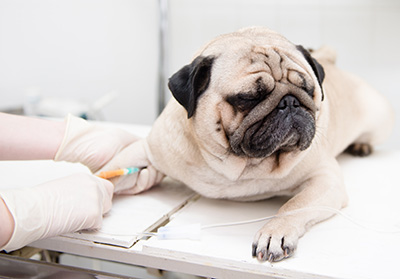Neurology

Small brachycephalic dog breeds, such as the pug and French bulldog, are prone to develop specific neurological conditions and spinal disorders in particular.
One group of conditions heavily associated with the body conformation of these dogs are vertebral and spinal malformations. Two specific vertebral malformations often seen in French bulldogs and pugs are hemivertebra and caudal articular process dysplasia.
A hemivertebra means ‘half vertebra’ and is characterised by incomplete formation of a vertebral body. This can lead to an abnormal dorsal curvature of the vertebral column, which is called kyphosis.
Caudal articular process dysplasia is characterised by an incomplete or even absent joint process (articular process) between two adjacent vertebrae.
Although these abnormalities can cause progressive and debilitating spinal disease, they are also often seen in clinically normal dogs. It can therefore be challenging to differentiate between clinically relevant and irrelevant vertebral malformations observed on imaging studies.
The RVC Neurology team can be considered one of the world leaders in the research on vertebral malformations in pugs and French bulldogs. Together with our collaborators, we have characterised the prevalence and nature of different types of vertebral malformations in pugs, French bulldogs and English bulldogs.
Our research has revealed that although vertebral malformations occur very commonly in these breeds, they are not often associated with neurological signs. Breed specific differences do, however, exist.
Although these malformations are not often causing clinical signs in French and English bulldogs, hemivertebra and caudal articular process dysplasia should be considered more concerning in pugs. The two biggest risk factors for a hemivertebra to cause clinical signs are: 1) when they occur in pugs and 2) when they are associated with severe angulation (i.e. kyphosis) of the vertebral column.
Clinical signs typically start in the first year of life, are progressive and our research has unfortunately suggested that non-operative treatment is associated with poor outcomes. Although surgery is technically challenging and expensive, positive outcomes can be obtained by this type of treatment.
Although hemivertebra with kyphosis is not often associated with clinical signs in French bulldogs, this condition should not be considered an innocent and benign condition in this breed. Our research has demonstrated that kyphosis causes French bulldogs to walk slightly differently and increases their likelihood to develop thoracolumbar intervertebral disk disease. Intervertebral disk disease is by far the most common spinal disorder in French bulldogs and is often associated with an sudden onset of severe and painful clinical signs.
Another spinal malformation that can be observed in these dogs is a spinal arachnoid diverticulum. This condition is characterised by a focal fluid accumulation on top of the spinal cord. It has therefore been compared to a fluid filled ‘cyst’ on the spinal cord. This fluid accumulation becomes gradually larger and will progressively compress the spinal cord. French bulldogs and especially pugs are predisposed for this condition, which inevitably results in slowly progressive spinal disease. The RVC Neurology Team has authored and contributed several studies that have resulted in a better understanding about the clinical presentation, diagnosis and treatment of spinal arachnoid diverticula in dogs.
